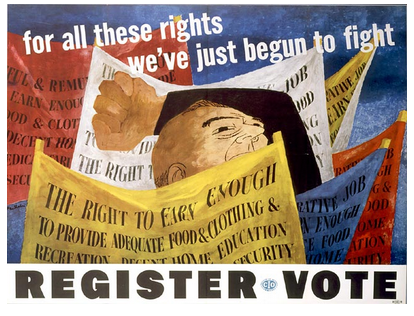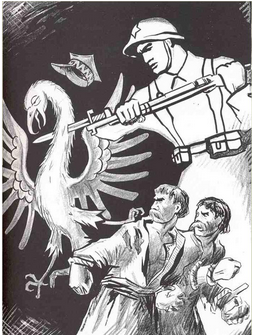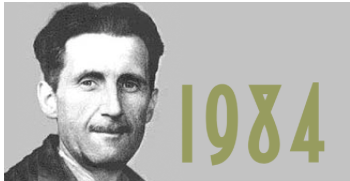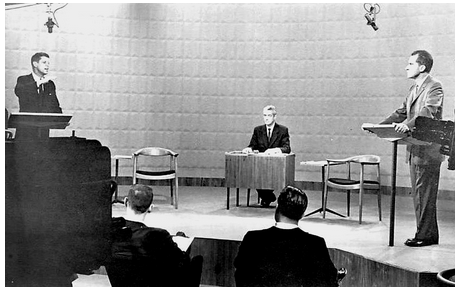Standard 4.6: Election Information
Evaluate information related to elections. (Massachusetts Curriculum Framework for History and Social Studies) [8.T4.6]
FOCUS QUESTION: How do Students Access and Assess Information about Elections and Politics?

Congress of Industrial Organizations poster by Ben Shahn (1946)
Library of Congress (164) "Ben Shahn and a Fight for Rights" | Public Domain)
Elections are essential to democratic systems of government. They give substantive meaning to the phrase “of the people, by the people, for the people.”
Through elections, people make known their choices between candidates, policies, and political parties. Elections decide who will lead cities, towns, states, and the nation. In his “Dissertation on the First Principles of Government” (1795), the American revolutionary Thomas Paine declared that “the right of voting for representatives is the primary right by which other rights are protected” (para. 11).
To participate in elections, voters need accurate and unbiased information. Without information to critically analyze the candidates and the issues, people cannot adequately assess the differences of the candidates and issues and understand the results of these for themselves or their communities.
How can students learn to critically evaluate information related to elections so they can participate fully as voters, citizens, and engaged community members?
The modules for this standard address that question by examining the impact of persuasion, propaganda, and political language in political campaigns, the role of Presidential debates in American politics, and the question of public versus private financing of elections.
1. INVESTIGATE: Persuasion, Propaganda, and Political Language in Elections
Understanding how persuasion, propaganda, and political language are used in elections and politics is essential to being an informed and engaged member of a democratic society.
- Persuasion means "to influence." Persuading is convincing someone to do or believe something that you want them to.
- Propaganda means "the spreading of ideas, information, or rumor for the purpose of helping or injuring an institution, a cause, or a person" (Merriam-Webster Dictionary, para. 2).
- Political language refers to how words, symbols, and images are used to influence people’s thinking about public policy issues and topics.
The goal of persuasion, propaganda, and political language is to persuade, to get readers, viewers, and listeners to agree with someone's ideas and endorse their proposals. To fully understand the impacts of these forms of language on elections and politics in a democracy, it is important to explore how politicians and political campaigns use them to motivate voters and supporters.
There are different kinds of propaganda, ranging from "selfish, deceitful, and subversive effort to honest and aboveboard promotion of things that are good" (American Historical Association, 1944, para. 5). To participate in elections and public policy debates, people must be able to separate harmful misinformation that is propaganda from fairly presented and accurate persuasive information that is meant to educate.
As University of Massachusetts Amherst history major William Huntington has observed, the United States has employed propaganda to promote actions that many would consider positive, such as U.S. involvement in WWII being seen as a virtuous action that contributed heavily to the Allies’ success in 1945. To operate in the war effectively, however, the United States government and military had to have the public on their side. To do so, the government engaged in extensive propaganda efforts to convince people of the righteous of the war. For more, view Use of Propaganda During World War II from NebraskaStudies.org.

1939 Soviet propaganda poster depicting the Red Army killing an oppressive Polish eagle
Image from Wikimedia Commons | Public Domain
Whlle by definition, propaganda is not inherently negative, a history of dishonesty has resulted in propaganda being considered inseparable from manipulation and control. Therefore, when most people refer to propaganda nowadays, there is an assumption that facts are being twisted for nefarious gain. In that sense, the use of propaganda is often frowned upon, regardless of context.
Dictators and totalitarian regimes have used propaganda to manipulate and control their citizens. Democratic governments, including the United States, have used propaganda to build public support for wartime policies and actions that the people might otherwise NOT want to do. Politicians also use propaganda to market themselves - make themselves more appealing - to voters.
Manufacturers and corporations use persuasive language to sell products - sometimes with propaganda techniques such as deceptive commercials and false advertisements. For many years, cigarette companies hid the harmful effects of tobacco in ads that featured smoking as a healthy and part of a fun-filled lifestyle.
Political language can be used to obscure, hide, or misrepresent, rather than inform as George Orwell (1946) famously said, “Political language is designed to make lies sound truthful and murder respectable, and to give an appearance of solidity to pure wind" (as cited in New Oxford Review, 2016, para. 2).
George Orwell and Political Language
 Image of George Orwell | Public Domain
Image of George Orwell | Public DomainOrwell’s novels 1984 and Animal Farm are examples of how powerful interests use information to control people and direct how they think and behave.
In 1984, an all-powerful dictator named Big Brother (modeled after the totalitarian Soviet leader Joseph Stalin) rules society through propaganda, political language, telescreens,Thought Police, and mind control. The ever-present state government relies on doublespeak, a form of language that deliberately distorts the meaning of words.
In Animal Farm, a group of barnyard animals revolt against their oppressive owner, a farmer named Mr. Jones. Over time, however, human-like greed causes the animals’ revolutionary society to lose its commitment to values of freedom and justice, leaving in place only one principle: “All animals are equal, but some animals are more equal than others.”
A Doublespeak Award has been given every year since 1974 by the National Council of Teachers of English as an ironic tribute to “public speakers who have perpetuated language that is grossly deceptive, evasive, euphemistic, confusing, or self-centered" (para. 3).
Trump and Twitter
Twitter has become a powerful tool for political persuasion and propaganda. Looking at the first two years of the Trump Presidency (which included the Mueller Investigation into Russian interference in 2016 presidential election), researchers found that whenever a politically uncomfortable or potentially unfavorable issue appeared in the media, Trump's Twitter account responded with tweets about unrelated topics, emphasizing his strengths as President and using language that appealed to his base of voters (Lewandowsky, et.al. 2020).
Terms like "jobs," "China," and "immigration" were used to signal how his administration was creating jobs for American workers while opposing China internationally and blocking immigration domestically. This pattern of diversion was not found to be present when the media was covering topics not related to or favorable to the Trump agenda.
Interestingly, Trump himself does not write many of this tweets. In 2018, NPR reported that Dan Scavino, the President's former golf caddie from 1990 and White House social media director, is the author of much of the content on the site @realDonaldTrump. Scavino also takes dictation and then crafts the message into grammatically correct language, further evidence of how Twitter was used to convey political information.
Media Literacy Connections: Social Media and the Elections
It is estimated that 72% of U.S. voters actively use social media (Social Media Could Determine the Outcome of the 2020 Election, Forbes, October 26, 2020). Social media provides politicians with expansive new opportunities to use political language and visuals to influence voters.
In these activities you will evaluate social media campaigns for an upcoming election at the local, state, or national level, then you will design an online campaign to support your run for political office.
 Watch on YouTube
Watch on YouTube
Suggested Learning Activities
- Design a Propaganda Graphic or Poster
- Review:
- Create your own propaganda graphic or poster art to change people's thinking and/or behavior about a candidate for political issue.
- Invent an Example of Doublespeak
- An example of DoubleSpeak is the use of the term "Downsizing" instead of "layoffs."
- Explore examples of Doublespeak at yourdictionary.com
- Then, create your own Doublespeak terms and incorporate them into a short persuasive essay.
- Create and Present
- Students imagine a movement for change that they’d like to see take place in the school and create propaganda posters in support or against.
- Students then present their posters alongside an explanation of their cause.
Online Resources for Persuasion, Propaganda and Political Language
2.UNCOVER: Presidential Debates in U.S. Politics
Debates are one of the major ways that candidates seek to gain the support of voters. They serve as a way for people to learn about the views and personalities of the candidates who are running in a primary or general election.
The idea of debates between candidates is famously associated with Lincoln/Douglas debates over slavery in 1858, but debate was a central feature of American politics since the Constitutional Convention. In the decades before the Civil War, candidates debated face-to-face, ordinary citizens took debating classes, and debating societies could be found in cities and small towns - although women were not allowed to debate (Lepore, 2018).
Debates by Presidential contenders is a 20th century development. In 1948, Republican Party presidential hopefuls Thomas Dewey and Harold Stassen were the first to debate one another on radio. 1960 marked the first televised Presidential debates between John F. Kennedy and Richard M. Nixon.

Photo of the first Kennedy/Nixon presidential debate, September 26, 1960
"First 1960 presidential debate" by Associated Press | Public Domain
Following the Kennedy/Nixon debates of 1960, there were no presidential debates until 1976. The Commission on Presidential Debates was established in 1987. Since then, debates among Presidential candidates have become made-for-television, and more recently, highly anticipated social media events. Millions of people watch them live. Commentators and supporters comment online about who said what and why, making debates fascinating events for learning about how elections now happen in this country.
How much do political debates matter in terms of who gets elected? Political scientists are undecided. The general consensus is that primary debates “help voters evaluate candidates and can change minds” (FiveThirtyEight, 2019, para. 5).
Presidential debates are another matter, particularly after what happened in the 2016 election. Virtually every poll indicated that Hillary Clinton won each one of the three debates with Donald Trump, yet although she won the national popular vote, she did not receive enough electoral college votes to become President.
It may be that the way the media covers the debates and comments on them after the fact is more important than the actual debates in influencing how voters subsequently respond at the polls. In one study, based on the 2004 debate between John Kerry and George W. Bush, participants who watched the debate on CNN thought Kerry won while those who watched on NBC thought Bush won (The 2004 Presidential Debate in Tempe).
Learn more about the history of debates at the resourcesforhistoryteachers wiki page American Presidential Debates.
Media Literacy Connections: Media Spin in the Coverage of Political Debates
Political debates provide politicians with a platform to share ideas and information with their constituents and potential voters. At the presidential level, debates have become huge media events. Some 73 million people watched the first debate between Joe Biden and Donald Trump in 2020.
Leading up to, during, and after the debates, political campaigns and partisan groups try to spin the results. Spin (also called political spin) is a term for how individuals use words and images to portray what happened in ways that put themselves in the most favorable terms. Commentators, too, often spin the results of debates in partisan terms.
In these activities, you will examine how news outlets covered the 2020 Vice Presidential debate between Kamala Harris and Mike Pence, then write purposefully biased reports in which you generate political spin about the event from different political perspectives.
 Watch on YouTube
Watch on YouTube
Suggested Learning Activities
- Learn Online
- Conduct a Mock Political Debate
- Choose an issue of importance in the school or community to debate with peers or another class/school.
- State Your View
- Do you think participating in or listening to a debate causes people to change their minds or does it just reinforce already held viewpoints?
- Which do you think has more influence on viewers: The actual debate or the media coverage of the debate?
Online Resources for Presidential Debates
3. ENGAGE: Should the United States Adopt Public Financing of Elections?
Public financing of elections has been proposed as a system for limiting the influence of wealthy donors and dark money on candidates and the political process. In theory, publicly funded elections mean that candidates would not have to raise enormous amounts of money from wealthy contributors and special interests.
Public financing means that candidates receive government funds to help pay the costs of running for political office. One version of publicly financed elections is small donor matching funds. In this approach, people who give small amounts of money to political candidates would have those contributions matched by the government. Learn more: The Case for Small Donor Public Financing in New York.
There is more about the powerful role of money in politics in Topic 4.13 of this book.
Suggested Learning Activity
- Argue Pro and Con
- Should there be public financing of elections?
Online Resources for Public Financing of Elections
Standard 4.6 Conclusion
In a democracy, free and fair elections require that voters have access to reliable and understandable information about candidates and issues. INVESTIGATE examined how persuasion, propaganda, and political language can be used to influence voters and determine elections. UNCOVER explored the history of presidential debates in American politics. ENGAGE asked whether there should be public financing of elections.